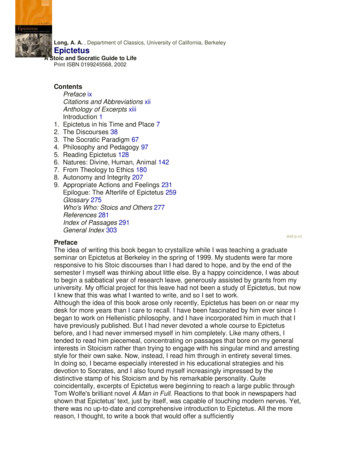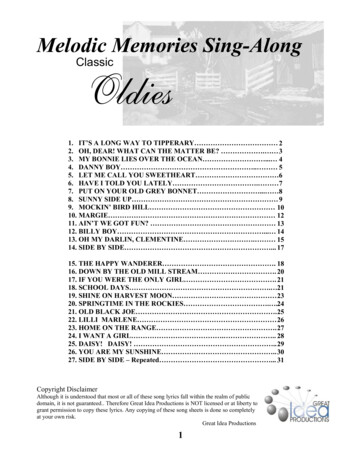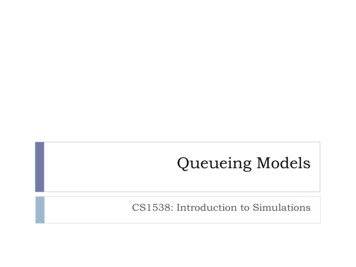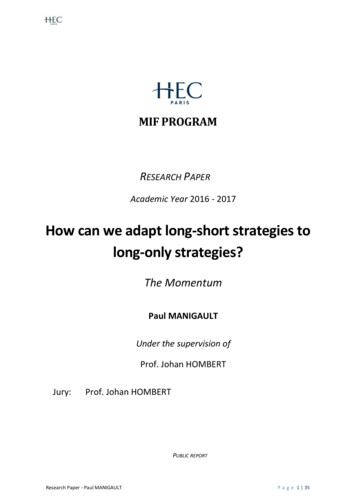
Transcription
Long, A. A. , Department of Classics, University of California, BerkeleyEpictetusA Stoic and Socratic Guide to LifePrint ISBN 0199245568, 2002ContentsPreface ixCitations and Abbreviations xiiAnthology of Excerpts xiiiIntroduction 11. Epictetus in his Time and Place 72. The Discourses 383. The Socratic Paradigm 674. Philosophy and Pedagogy 975. Reading Epictetus 1286. Natures: Divine, Human, Animal 1427. From Theology to Ethics 1808. Autonomy and Integrity 2079. Appropriate Actions and Feelings 231Epilogue: The Afterlife of Epictetus 259Glossary 275Who's Who: Stoics and Others 277References 281Index of Passages 291General Index 303end p.viiPrefaceThe idea of writing this book began to crystallize while I was teaching a graduateseminar on Epictetus at Berkeley in the spring of 1999. My students were far moreresponsive to his Stoic discourses than I had dared to hope, and by the end of thesemester I myself was thinking about little else. By a happy coincidence, I was aboutto begin a sabbatical year of research leave, generously assisted by grants from myuniversity. My official project for this leave had not been a study of Epictetus, but nowI knew that this was what I wanted to write, and so I set to work.Although the idea of this book arose only recently, Epictetus has been on or near mydesk for more years than I care to recall. I have been fascinated by him ever since Ibegan to work on Hellenistic philosophy, and I have incorporated him in much that Ihave previously published. But I had never devoted a whole course to Epictetusbefore, and I had never immersed myself in him completely. Like many others, Itended to read him piecemeal, concentrating on passages that bore on my generalinterests in Stoicism rather than trying to engage with his singular mind and arrestingstyle for their own sake. Now, instead, I read him through in entirety several times.In doing so, I became especially interested in his educational strategies and hisdevotion to Socrates, and I also found myself increasingly impressed by thedistinctive stamp of his Stoicism and by his remarkable personality. Quitecoincidentally, excerpts of Epictetus were beginning to reach a large public throughTom Wolfe's brilliant novel A Man in Full. Reactions to that book in newspapers hadshown that Epictetus' text, just by itself, was capable of touching modern nerves. Yet,there was no up-to-date and comprehensive introduction to Epictetus. All the morereason, I thought, to write a book that would offer a sufficiently
end p.ixin-depth treatment in a manner that could attract new readers to him as well as thoseto whom he needs no introduction.That is what I have tried to do, with the strong encouragement of Peter Momtchiloff ofOxford University Press and his anonymous advisers, for whose advice at theplanning and later stages I am most grateful. I do not presume any prior knowledgeof Epictetus or Stoic philosophy, and I have liberally included my own translations ofnumerous passages, using these as the basis for all my detailed discussions. Theseexcerpts are the most important part of the book, because its main purpose is toprovide sufficient background and analysis to enable Epictetus to speak for himself.What he says, however, often stands in need of clarification and interpretation.Research on Epictetus has a long way to go. I hope I have contributed a number offresh ideas, but it would defeat the purpose of this book if I defended them in themain text with a barrage of scholarship. At the end of chapters I appendbibliographical details and provide guidelines on various details and points ofcontroversy.My warm thanks are due to numerous people. First, I am delighted to mention allthose who attended my seminar on Epictetus: Chris Brooke, Tamara Chin, LucaCastagnoli, James Ker, Erin Orzel, Miguel Pizarro, Walter Roberts, Tricia Slatin, BelleWaring, and two visiting scholars, Antonio Bravo Garcia and Bill Stephens. I learnt alot from them all, and I especially thank Chris Brooke, whose seminar paper onEpictetus in early modern Europe introduced me to some references I have gratefullyincorporated in my Epilogue. I have been wonderfully served by Christopher Gill,Brad Inwood, Vicky Kahn, and David Sedley. They read the entire first draft of thebook and gave me extremely helpful comments. Peter Momtchiloff has been asplendid editor, not only through his publishing expertise but also by acting as thebook's model reader. Our e-mail correspondence over the past year has been a greatstimulus and pleasure to me.The final product is appreciably better as a result of all this advice. I have benefitedfrom the publications of scholars too numerous to acknowledge completely, butamong my contemporaries I especially thank Rob Dobbin, Christopher Gill, RachanaKamtekar, Susanne Bobzien, Michael Frede, David Sedley,end p.xPierre and Ilsetraut Hadot, Brad Inwood, Julia Annas, Jonathan Barnes, and RobinHard. James Ker, a graduate student at Berkeley, has earned my gratitude not onlyby assembling data and checking references but also by vetting my translations andsuggesting other improvements. I am also very grateful to Hilary Walford for her careand courtesy as my copy-editor and to Charlotte Jenkins for her fine management ofthe book's production.I presented some of the material in Chapters 3 and 4 as Corbett Lecturer at theUniversity of Cambridge, and this is now published in my article, 'Epictetus asSocratic Mentor', Proceedings of the Cambridge Philological Society, 45 (2000), 7998. I also gave related talks to the Loemker Conference on Stoicism, at EmoryUniversity, Atlanta, the Stoicism seminar at the Centre Léon Robin of the Universityof Paris Sorbonne, the Philosophy Department of the State University of Milan, andthe Philosophy and Classics Departments of the University of Iowa. I am very gratefulfor these invitations, especially to Steve Strange, Jean-Baptiste Gourinat, FernandaDecleva Caizzi, and John Finnamore, and for the feedback I received in discussionsfollowing the lectures. When my typescript was in its final stages, I delivered some ofthe material in a series of seminars at the École Normale Supérieure of Paris underthe kind auspices of Claude Imbert. My French colleagues and students were a
wonderful audience, and their comments enabled me to make several last-minutecorrections and additions. Finally I thank the University of California Berkeley for theHumanities Research Fellowship I was given and also the Office of the President ofthe University of California for the award of a President's Research Fellowship in theHumanities.I dedicate this book to my wife, Monique Elias. With her artistry, beauty, andspontaneity, she has seen me through all the dry days, and she has been amagnificent companion at every stage of composition.A.A.L.BerkeleyJune 2001end p.xiCitations and AbbreviationsReferences to ancient authors are generally given in full. For citations in the formFrede (1999), see the References. The following abbreviations are used:ANRWAufstieg und Niedergang der römischen WeltDL Diogenes LaertiusEnch. Epictetus' Encheiridion or Manual, compiled by ArrianEN Aristotle, Nicomachean EthicsIn Ench. Simplicus' commentary on the EncheiridionLS A. A. Long and D. N. Sedley, The Hellenistic Philosophers, 2 vols.(Cambridge, 1987). Volume i includes translations of the principal sources,with philosophical commentary, and volume ii gives the corresponding Greekand Latin texts, with notes and bibliography. A reference in the form LS 61Arefers to the chapter number of either volume and the corresponding letterentry.SVF Stoicorum Veterum Fragmenta, ed. H. von Arnim, 3 vols. (Leipzig, 1903-5).This is the standard collection of evidence for early Stoicism.end p.xiiAnthology of ExcerptsEpictetus' discourses translated in full or extensively:6 God's oversight of everyone (1.14), pp. 25-615-17 Rationality and autonomy (1.1), pp. 62-422 Every error involves involuntary conflict (2.26), pp. 74-524 Misunderstanding one's own motivations (1.11), pp. 77-825, 36 The starting-point of philosophy (2.11), pp. 79-80, 102-330-1 Misapplications of Socratic argumentation (2.12), pp. 86-865-9 Rationality and studying oneself (1.20), pp. 129-3670-4 Lapsing from integrity (4.9), pp. 137-4081 Kinship with God (1.3), p. 157115 Resisting temptation (2.18), pp. 215-16124 Goodness and correct volition (4.5), pp. 226-7Selection of shorter excerpts:4 Meeting a philosopher, p. 125 No excuses accepted, pp. 14-158, 114 Progress, pp. 45, 2109-11 Lecturing on philosophy, pp. 52-426-8, 33-5 Human propensities, pp. 81-5, 98-10037-40 Scepticism, pp. 104-643, 47, 62, 103, 137 Philosophy's demands, pp. 108-9, 111-12, 120, 194-5, 246
4 Meeting a philosopher, p. 1244-5, 126 The human profession, pp. 110-11, 23363 Epictetus on his teaching mission, pp. 123-476 The purpose of education, p. 15379, 80 Divine creativity, p. 15592-3 Humans and other animals, pp. 173-495, 103, 117 The things that are one's own, pp. 187, 194, 22197-9 Divine laws, pp. 187-9end p.xiii100-2, 140 Happiness, pp. 191, 249104-8 Self-interest and community participation, pp. 197-201109-10 Life as a game of skill, pp. 202-3112-13 Freedom and volition, pp. 208-10118-21 Natural integrity, pp. 224-5126 Adapting to circumstances, p. 234128, 137 Mortality and contentment, pp. 235, 248129-30 Fulfilling one's family obligations, pp. 236-7131 Assessing one's own character, p. 238135-6 Life as a dramatic performance, p. 242138 Judgements and emotions, p. 246141-2 Tolerance, pp. 251-2end p.xivIntroductionshow chapter abstract and keywordshide chapter abstract and keywordsA. A. LongEpictetus is a thinker we cannot forget, once we have encountered him, because hegets under our skin. He provokes and he irritates, but he deals so trenchantly withlife's everyday challenges that no one who knows his work can simply dismiss it astheoretically invalid or practically useless. In times of stress, as modern Epictetanshave attested, his recommendations make their presence felt.Living as an emancipated slave and Stoic teacher in the Roman Empire, Epictetusinhabited a world that is radically different from the modern West. Yet, in spite ofeverything that distances him from us—especially our material security, medicalscience, and political rights, and his fervent deism—Epictetus scarcely needsupdating as an analyst of the psyche's strengths or weaknesses, and as aspokesman for human dignity, autonomy, and integrity. His principal project is toassure his listeners that nothing lies completely in their power except theirjudgements and desires and goals. Even our bodily frame and its movements are notentirely ours or up to us. The corollary is that nothing outside the mind or volition can,of its own nature, constrain or frustrate us unless we choose to let it do so.Happiness and a praiseworthy life require us to monitor our mental selves at everywaking moment, making them and nothing external or material responsible for all thegoodness or badness we experience. In the final analysis, everything that affects usfor good or ill depends on our own judgements and on how we respond to thecircumstances that befall us.end p.1Epictetus expounds these ideas in numerous ways, but he is chiefly concerned withthe training and contexts for their implementation, and with rebutting objections tothem. The contexts range over the whole gamut of human experience—tyrannicalthreats to life and limb and political freedom, loss of property, jealousy and
resentment, anxiety, family squabbles and affections, sexual allure, dinner-tablemanners, bereavement, friendship, dress, hygiene, and much more. This guide to lifeis as demanding as it is comprehensive; for it is central to Epictetus' philosophy thatno occasion is so trivial that his salient doctrines do not apply.His cultural and historical significance have never been in doubt. He was revered bymany of his contemporaries and by those, including the Emperor Marcus Aurelius,who knew him later through his student Arrian's record of his teaching. EarlyChristian writers mentioned him approvingly, and Simplicius, the great Neoplatonistcommentator on Aristotle, wrote a commentary on the Manual. Translations of thisabridgement of Epictetus were so familiar during the seventeenth and eighteenthcenturies that Epictetus became virtually a household name for the European andearly American intelligentsia. William Congreve starts his play Love for Love with apenniless young man reading Epictetus in his garret. Elizabeth Carter, a prominentmember of the Bluestocking Circle, was the first person to translate the whole ofEpictetus into English. Her near contemporaries, Shaftesbury and Butler, are two ofthe British moralists who invoked him during the eighteenth century, and in Americahis later admirers included Thomas Jefferson, Walt Whitman, and Henry James.For much of the nineteenth and twentieth centuries, however, Epictetus was not acentral figure. He was largely treated as a Stoic popularizer, lacking depth andcreativity. Since about 1970 Epictetus has begun to regain his former status as apowerful thinker on ethics and education, worthy of discussion alongside Socratesand Plato, but he still tends to be read selectively, either as the author of maximspreaching self-reliance or simply as a spokesman for Stoic philosophy or for lifeunder the Roman Empire. Happily that situation is changing, as this book'sReferences section shows. Yet, there is no modern book that presentsend p.2Epictetus in the round as author, stylist, educator, and thinker. That is the gap I hopeto fill by publishing this volume.Epictetus can be explored from many different perspectives. These includeintellectual and social history, the interpretation of Stoicism, ethics and psychology,both ancient and modern, the theory and practice of education, rhetoric, and religion.As a historian of ancient philosophy by profession, I have concentrated on theanalysis of Epictetus' main ideas, but all the perspectives I listed are relevant to mygoal—which is to provide an accessible guide to reading Epictetus, both as aremarkable historical figure and as a thinker whose recipe for a free and satisfyinglife can engage our modern selves, in spite of our cultural distance from him. I havegiven a lot of space to translated excerpts, building my discussion of many detailsaround these, and I have also included the full text of several of the shorterdiscourses. All these passages are numbered throughout the book, and I havecollected the main ones at the beginning in an Anthology of Excerpts, where they arebriefly described for ease of reference.I start from the assumption that Epictetus is deceptively simple to read, or, rather,that he is a complex author with patterns of thought and intention, including irony,that have been scarcely appreciated. When he is read rapidly and selectively,Epictetus can appear hectoring, sententious, or even repellent. I do not maintain thatthese qualities simply disappear under analysis. His work contains passages I prefernot to read, which have even on occasion deterred me from writing this book. Yet Iam also convinced that a good many candidates for such passages are ironical or atleast rhetorically motivated by reference to cultural conventions, his educationalprogramme, and its youthful audience.
Epictetus has also been misunderstood because his appeals to theology, which areubiquitous, have been consciously or unconsciously read in the light of Christianity.In my opinion, Epictetus' deepest ideas are remote from the main Christian message,notwithstanding notable parallels between some things he says and the NewTestament. His ethical outlook includes stark appeals to self-interest, which askpersons to value their individual selves over everything else. Yet, Epictetus is amoralist, anend p.3advocate of uncompromising integrity in human relationships and a forerunner ofKant in his stance that material considerations and contingencies have no bearing onthe rightness of a right action. How his theology, egoism, and social commitments tietogether is a major question, and one that has been little addressed up to thepresent. I try to answer it in the second half of this book.A further source of misunderstanding has been the description of his teachings asdiatribes or sermons, with the implication that he is a preacher to human beings, or atleast men, in general. I prefer to call the surviving record of his work dialecticallessons, in order both to call attention to his persistently conversational idiom and toregister his deliberate affiliation to Socratic dialectic. Socrates, rather than any Stoicphilosopher or even the Cynic Diogenes, is Epictetus' favoured paradigm, not only asa model for life but also as a practitioner of philosophical conversation. The point isnot that Epictetus refrains from sermonizing or haranguing; that is one of his styles.But it is a style he adopts in response to a specific audience.Our Epictetus is only what his pupil Arrian chose to record, edit, and then publish.Like Socrates, Epictetus did not compose for publication, but Arrian's reports put usin the position of being a fly on the wall in his private classes, and on occasions whenhe was visited and consulted by someone passing through. Taking account of thisauditory context, which quite often focuses upon a single, generally anonymousindividual, is indispensable if we want to evaluate the tone and purpose of numerousdiscourses. Epictetus is typically addressing precisely the people—young men—whohave opted to study with him. Recognition of this audience aids appreciation of thehyperbole, irony, and repetitiousness that are characteristic of his teaching.I have tried to make this book as accessible as possible by sparing use of footnotesand by largely confining bibliographical and other scholarly matters to appendices atthe end of chapters. To the extent that seemed essential I have explained Epictetus'relation to his Stoic authorities and tradition, and I have sometimes compared himwith the other Roman Stoics. But I have been concerned throughout to keep thefocus on Epictetus as author,end p.4letting him speak for himself rather than reducing him to the status of one amongother Stoic philosophers. Much more could be said than I have offered by way ofpositioning him within the Stoic tradition. My excuses for playing this history down aresimple—such a treatment would not only have turned this into a lengthy andtechnical book, which I was keen to avoid; it would also have detracted from thedistinctive power of Epictetus' voice. Readers who are eager to compare Epictetuswith other Stoics will find ample material in the sections of Further Readings andNotes that I have appended to the chapters.The book is designed to be read in the sequence of the chapters, but each of thesecan also be approached independently. Those who are interested in first samplingEpictetus' discourses could consult the Anthology of Excerpts or begin with Chapter5, where I translate two short discourses in full and give a detailed analysis of theirstyle and thought. Chapters 1-4 are chiefly concerned with placing Epictetus in his
intellectual and cultural context and with the methodology of the discourses. InChapters 6-9 I focus on the themes and concepts that I find central to his thought andits fundamental unity. However, this division is by no means hard and fast. Thereader who reaches Chapter 6 after proceeding through all the earlier chapters willhave already seen most of Epictetus' principal concepts at work. What I offer inChapter 6 onward is a more sustained treatment of his philosophy, topic by topic.This procedure involves some unavoidable repetition, but any account of Epictetusthat disguised his repetitiousness would be quite misleading. In an Epilogue I give aselective account of Epictetus' afterlife in Europe and America, and I also ask whatwe can make of him today.A final word about my translations. I have naturally striven for accuracy, and by that Iinclude respect for the tone and rhetoric of the original rather than a literalness thatcould jar or misrepresent the effect of Epictetus' Greek. For example, Epictetus oftenuses the vocative anthrôpe, literally '(O) human being' or '(O) man'; but neither ofthese translations works in modern English. So I have preferred to write 'friend' or 'myfriend'; and I occasionally use a modern colloquialism such as 'wow!', where thatseems just right to capture the feel of the original. Becauseend p.5the discourses are largely composed as conversations, I have tried to reproduce thateffect by having my excerpts printed accordingly, with the interventions of Epictetus'generally fictive interlocutors, or his responses to his own questions, presented initalics. The original text lacks most modern devices of punctuation, and it can bedifficult to decide how to distribute its questions and answers. When in doubt, I haveadopted continuous paragraphs, so readers can be confident that whatever appearsin the book as dialogue is so in the original.Further Reading and NotesTexts and TranslationsThe most accessible Greek text of Epictetus, together with English translation, is thetwo-volume Loeb edition of Oldfather (1925-8). This includes the four books ofdiscourses, the Manual, and fragments (short excerpts quoted by various ancientauthors from works that have not otherwise survived). The major edition of the Greektext of the discourses is Schenkl (1916), and there is also an excellent four-volumeedition, together with French translation and detailed introduction, by Souilhé (194865). Boter (1999) is the best edition of the Manual. His book includes a remarkableaccount of that work's manuscript tradition, and Boter has also edited Greek versionsof the Manual that were adapted to monastic use; see p. 261 below.There is no modern commentary on the whole of Epictetus, but Dobbin (1998) is anoutstanding commentary on book 1 of the discourses, together with translation.Gourinat (1996) is a French translation of the Manual with a fine introduction toEpictetus and his Stoicism. Hadot (2000) is a further French version of the Manualwith an excellent analysis of the work's structure. For commentary on 3.22 (on theideal Cynic), see Billerbeck (1978), and for commentary on Epictetus' discourses thatdeal with logic, Barnes (1997).The best English translation of Epictetus in entirety is Hard in Gill (1995). For theManual on its own, see White (1983).end p.6Chapter 1 Epictetus in His Time and Placeshow chapter abstract and keywordshide chapter abstract and keywordsA. A. Long
What else am I, a lame old man, capable of except singing hymns to God? If I were anightingale, I would do the nightingale's thing, and if I were a swan, the swan's. Well,I am a rational creature; so I must sing hymns to God. This is my task; I do it, and Iwill not abandon this position as long as it is granted me, and I urge you to sing thissame song.(1.16.20-1)1.1 OrientationIn the early years of the second century AD , with the Roman Empire under Trajan, itsmost effective ruler since Augustus, a group of young men were to be found studyingtogether in the city of Nicopolis, situated immediately north of the modern Greek portof Préveza on the Ionian Sea. They were the students of Epictetus. One of them,Arrian, made a detailed record of his master's teaching, and it is these Discoursesthat enable us to read Epictetus today and to treat him as a virtual author in his ownright.Epictetus was a Stoic philosopher, one of many to be found in Rome and other citiesof its vast empire. The essence of his teaching went back to Zeno, Cleanthes, andChrysippus, theend p.7founding fathers of Stoicism in the third century BC at Athens. Their original writingsare lost, and, although some of what they contained is recoverable through accountsby later authors, Epictetus is the Stoic teacher we are in a position to read mostextensively.For that alone his work would be important, but its value and interest go far beyondwhat it tells us about the doctrines and rationale of Stoicism. In Epictetus' work thatphilosophy is not so much expounded as lived, made urgent and even disturbing byhis remarkable personality and powers of expression. He has an inimitable way ofspecifying and interpreting Stoicism for his students, and he appropriates Socratesmore deeply than any other philosopher after Plato. These things, together with muchelse that will be explored in this book, make Epictetus one of the most memorableand influential figures of Graeco-Roman antiquity.Epictetus needs no defence concerning his capacity to interest and challengemodern readers. Thanks to the celebrated Manual, a summary set of rules anddoctrines that Arrian extracted from Epictetus' discourses, he has never gone out of1print.1'Manual' translates the Greek encheiridion (abb. Ench.), sometimes rendered as 'handbook'.He has even been copiously quoted in Tom Wolfe's bestselling novel A Man in Full,where the character who encounters a book containing translations of Epictetus findshis life transformed accordingly, and converts another character to Stoicism. Thepopularity of self-help books and therapy sessions has its ancient prototype in theManual, where one finds such thoughts as these:1Don't ask that events should happen as you wish; but wish them to happen as theydo, and you will go on well. (Ench. 8)2Sickness is an impediment to the body, but not to the will unless the will consents.Lameness is an impediment to the leg, but not to the will. Tell yourself this at eacheventuality; for you will find the thing to be an impediment to something else, but notto yourself. (Ench. 9)end p.83
If someone handed your body over to a passerby, you would be annoyed. Aren't youashamed that you hand over your mind to anyone around, for it to be upset andconfused if the person insults you? (Ench. 28)Packaged in this way, Epictetus has his appeal, but if this were all we would scarcelycall him a major precursor of our modern philosophical tradition. We would relate himrather (and I do not mean disparagingly so) to the rule books of Christianmonasticism or to the Wisdom literature of Buddhism and Confucianism. Thosecontexts and their meditative practices are appropriate up to a point; Epictetusrecommended his students to concentrate on such thoughts as those excerptedabove, and some of his work has a mantra-like quality. The excerpts of the Manual,however, are only that—passages Arrian organized, selected, and compressed fromthe full record in order to present Epictetus' teaching in a more accessible andmemorable form. They give a limited and somewhat grim impression of his thinkingand speaking in his actual Discourses.There, rather than advancing maxims and potted doctrines, he chiefly tries to showwhy the prescriptions of the Manual are grounded in truths he thinks he can proveconcerning the nature of the world at large, human nature, and a rational mind'sdialogue with itself. In addition, he addresses this instruction quite specifically to hisstudent audience, relating it to questions and problems they face as would-be Stoicsand as persons engaged in social life, with aspiration to various careers including theteaching of philosophy. To engage their attention, he intersperses quiet reflectionswith histrionic wit, hyperbole, and Swiftian pungency. The Discourses represent aunique blend of philosophy, pedagogy, satire, exhortation, and uninhibited dialogue.In this book, therefore, my focus will be on the Epictetus of the Discourses ratherthan the potted excerpts of the Manual.end p.91.2 BiographyLittle is known of the details of Epictetus' life. He was born probably in the years AD50-60 at Hierapolis, a major Graeco-Roman city in what today is south-westernTurkey, 100 miles due east of Ephesus, and connected with that great centre by aRoman road. Probably a slave by birth rather than seizure, he was acquired byEpaphroditus, a famous freedman and the secretary of the Emperor Nero. This mayhave happened after Nero's death in AD 68, but Epaphroditus resumed his secretarialcareer under Domitian (accession AD 81). We can infer, then, that the youngEpictetus had direct experience of the imperial court. This is confirmed by his vividreferences to persons soliciting emperors, hoping for favours from people likeEpaphroditus who had the emperor's ear, and by his anecdotes about the fate ofthose who had incurred imperial displeasure.In the Discourses Epictetus speaks of himself as a lame old man (1.16.20). Hislameness may have developed only in later life, but Christian sources attribute it tothe cruelty of a master, though not to Epaphroditus specifically; and in fact Epictetusmentions his former owner in ways that, though not complimentary, are far fromsavage (1.1.20; 1.19.19; 1.26.11). He was permitted, while still a slave (1.9.29), toattend lectures by Musonius Rufus, a prominent Stoic teacher, and Epaphroditusmay have freed him soon after this began. Under the patronage of Musonius,Epictetus probably began his teaching career in Rome. In AD 95 Domitian banishedall philosophers not only from the capital but also from Italy itself. It was presumablyat this time that Epictetus moved to Nicopolis with a reputation sufficiently assured toenable him to attract students there and to live simply off payments he received fromthem.
Nicopolis, founded by Augustus to commemorate his victory over Marc Antony atnearby Actium (31 BC ), was a large and resplendent city, as its modern remains stillshow. It became the political and economic centre for Roman rule in western Greece,while its coastal location made it the stopping place for numerous persons travellingbetween Greece and Italy. In choosing Nicopolis as the site for his school, Epictetuswas noend p.10doubt influenced by the city's metropolitan status and facilities. His students will havefound good lodgings there, and the resources of
Epictetus A Stoic and Socratic Guide to Life Print ISBN 0199245568, 2002 Contents Preface ix Citations and Abbreviations xii Anthology of Excerpts xiii Introduction 1 1. Epictetus in his Time and Place 7 2. The Discourses 38 3. The Socratic Paradigm 67 4. Philosophy and Pedagogy 97 5. Reading Epictetus 128 6.











